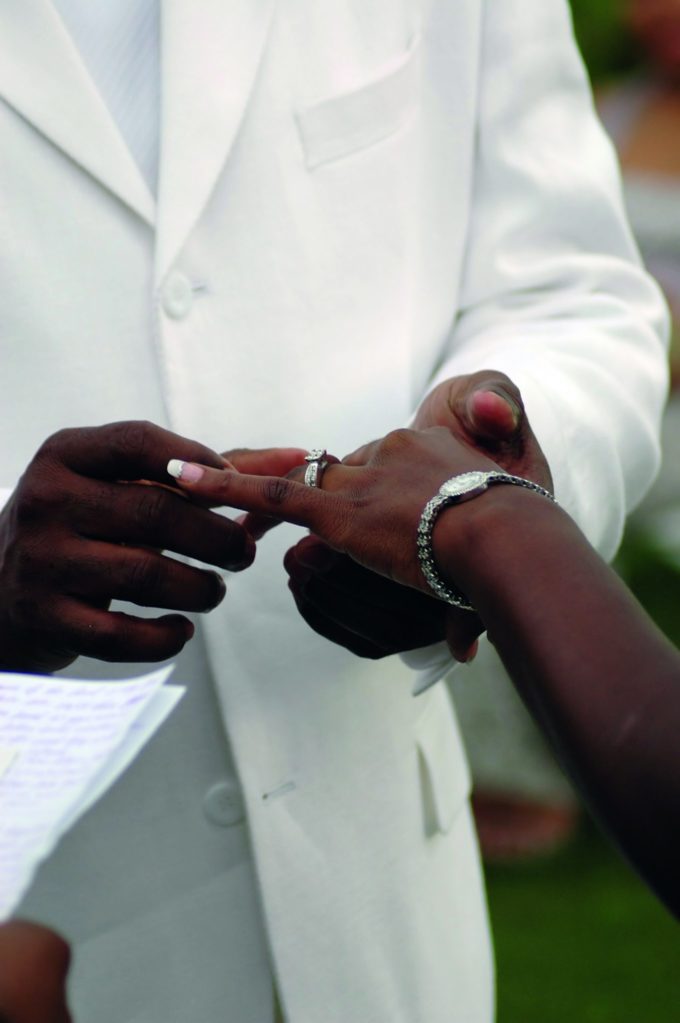Ten years ago, weddings across Africa were planned at home—your aunties did the cooking; close relatives sewed the wedding dress and the simple church ceremony was followed by speeches, a meal and dancing.

These days we have wedding planners, six course menus and everything from make-up artists and hairdressers to professional photographers. Even though most couples hold on to the traditional ceremony, the white wedding has taken center stage amid tiers of glamorous cakes, flowing champagne and designer gowns. Many of these weddings even have themes—Duduzile Zuma, the daughter of South African President Jacob Zuma, chose a Parisian theme.
Money appears to be no obstacle. The price tag ranges from $10,000 to $50,000 for the middle class; the super-rich spend millions. Nigerian billionaire Mike Adenuga is believed to have spent $2 million on his daughter`s wedding. The white wedding, replete with its extravagance and squabbles, has truly landed in Africa.
“I got married recently and did our traditional wedding ceremony with 300 guests at the countryside. It included dowry and all other required traditional rites, but we still came back to Nairobi to plan our contemporary wedding,” says James Masese, a local businessman.
Loading...
He adds that his parents, who live up country didn’t really understand why there was a need to have an expensive white wedding in the city, but he wanted to have a fun, classy, party—it cost him $25,000 to entertain 200 guests.
Like the Maseses, many other couples living in cities feel strongly that the white wedding is a necessity, not only because they get official wedding certificates but there is a desire to make a statement. A big white statement that is! Being married according to European customs—wearing a white lace dress; exchanging vows and rings amid a sea of flowers; an enormous buffet; a tiered cake and dancing the night away—is fast becoming a way of keeping up with the Joneses.
The generational gap between parents and their children, when it comes to weddings, is slowly closing. Many parents, living in cities, will host the traditional ceremonies in their homes with outside caterers, marquees, decorated tables and flowers as they try to keep up with the times. They also help their children pay for their white weddings because expenses increase yearly; they want to ensure a great party and it gives them status amongst their friends to be able to do this.
“Brides and grooms seem to be splurging more on a lot of things that didn’t matter 10 years ago. The cakes are getting more dramatic, there’s a lot of attention to the wedding fashion and today couples want to have fun at their wedding,” says Funmilayo Victor-Okigbo, a top wedding consultant with The Wedding Company in Nigeria. “Gone are the days of sitting at the ‘high table’ looking miserable as they want to be where the action is. There’s a lot of attention to entertainment as most weddings end up being a music concert with two to four Nigerian artists performing live, depending on the budget. It’s no longer just enough to have a band perform,” she says.
Kanyi Ohawa, a wedding stationery designer based in Kenya agrees. Customized invitations done by her firm, All and Sundry Designs, set back clients $4-7 each.
“Ten years ago, invitations were on a single sheet of paper on embossed text in a plain envelope. Today, everyone wants a customized invitation card. A bride will come in and say this is my personality and my fiancé’s, can you come up with something that reflects us and stands out? Cards can have buttons, bows, beads, metals, bones, twigs and come in all shapes. The more unique [it is], the better it is! The wedding invitation is what sets the stage for the wedding day.”
These days, the lovebirds want all the bells and whistles to ensure an out-of-this-world celebration. Annual wedding exhibitions have become must-attend events, whether you are in Lagos, Kampala or Nairobi. The Wedding Expo—which was established 10 years ago and has two exhibitions in Johannesburg annually—is the biggest in South Africa, with 30,000 visitors and more than 300 exhibitors. Book stores are stacked with bridal magazines and wedding directories, which promise to help the couple find their perfect ‘supplier’ match. Many couples also enroll for dance classes so as to impress their guests on the night. Meanwhile, Kenya has been hit by wedding reality TV shows that air on Sundays.
“I have to be home every Sunday evening to watch both shows to see what other brides did for their wedding day and to make sure I do something better,” says Mercy Murungi, who is planning her December wedding. She admits that she has become wedding obsessed and her biggest fear is that her budget of $18,000 will not match her wants.
It is these kinds of pressures that are keeping brides on their toes in their efforts to outdo each other, regardless of budget.
“Some of the most costly weddings in Nigeria range from $500,000 to a couple of million dollars. It really depends on the family; how far they are willing to go and their social class. Nigerians love to look good as we’re very fashionable. A lot of money goes towards jewelry and clothes and then on drinks—we love our champagnes here!” says Victor-Okigbo.
Of course, this has meant booming business for the wedding industry. Suppliers of cakes, flowers, marquees and bridal gowns have been on the rise as they cash in on white wedding fever.
And then there’s the honeymoon.
Loading...
